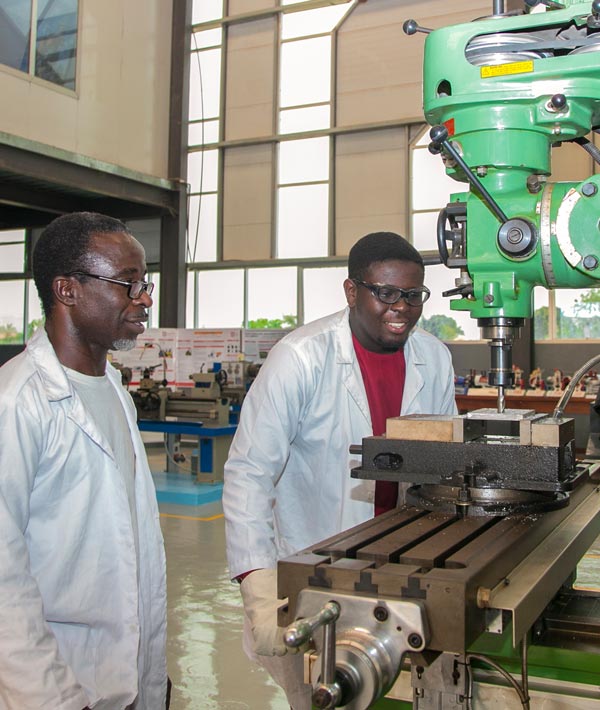Bachelor of Science in Industrial & Systems Engineering
March 5, 2025 2026-01-08 11:30Bachelor of Science in Industrial & Systems Engineering
Leading Africa’s Industrialization Agenda
When the Peduase Declaration was made by the Government of Ghana in 2019, the unique initiative for widespread industrialization in Ghana set in motion the need to train young Ghanaians with the core capabilities in advanced manufacturing engineering technologies, systems integration protocols, advanced material systems, and integrated product development capabilities.
As nations across Africa turn to industrialization as the main driver for economic growth, mastering the skill for the innovative deployment of technology to enhance productivity cannot be overemphasized.
Academic City University, Ghana has taken up the challenge to deploy a cutting-edge program in Industrial and Systems Engineering benchmarking leading institution across the world offering similar top-notch and time-tested programs
BSc Industrial & Systems Engineering at ACity
Industrial & Systems Engineering is a branch of engineering that designs, analyses, implements, and improves systems of people, information, and materials using mathematical, statistical, and scientific techniques. Such systems frequently involve complex human-machine interactions. Industrial & Systems engineers work hard to ensure that these systems are safe and efficient.
Top Careers In Industrial & Systems Engineering
A Bachelor's degree in Electronics and Communication Engineering means a career in any of these:
- Manufacturing Engineer
- Industrial Engineer
- Safety Engineer
- Quality Control Expert
- Robotics Engineer
- Logistician
Entry Requirements
Minimum C6 in 6 subjects including 3 core subjects (English, Mathematics, Integrated/General Science) and 3 elective subjects. (Physics, Elective Mathematics + Chemistry OR any other elective relevant to the chosen Program)
Minimum D or a pass in 6 subjects including 3 core subjects (English, Mathematics, Integrated/General Science) and 3 elective subjects. (Physics, Elective Mathematics + Chemistry OR any other elective relevant to the chosen Program)
Minimum of 5 credit passes in the IGCSE/O-Levels (Mathematics and English mandatory) and 3 passes in the A-Levels. (Elective/Add/Further Mathematics and Physics mandatory).
Minimum of 5 credit passes in the IGCSE/O-Levels (Mathematics and English mandatory) and a minimum score of 4 points in 3 Higher Level (HL) subjects. (Elective/Add/Further Mathematics and Physics mandatory)
Minimum of 50% overall average pass. (subject to approval NAB) Mathematics, English and Physics mandatory
Minimum GPA of 3.0 (Mathematics, English and Physics mandatory)

Electives
Advanced Manufacturing
- Micro and Nano Manufacturing
- Welding Engineering
- Digital Manufacturing
- Laser Processing
Automated Manufacturing and Integration
- Computer Control of Manufacturing Processes
- Industrial Robotics and Flexible Assembly
- Industrial Control Systems
- Optimization of Large Systems
Computer-Aided Design and Manufacturing
- Advanced CAD and CAM
- Computer Aided Design and Prototyping
- Advanced Manufacturing Processes and Practices Quality Control
- Design for Manufacturability
Manufacturing Processes, Systems and Planning
- Advanced Manufacturing Processes
- Integrated Production Systems
- Advanced Manufacturing Operations
- Artificial Intelligence and Expert Systems
Course Outline
- Communication Skills
- French Language
- Fundamentals of Innovation and Entrepreneurship (FIE) Seminar I
- Introduction to Engineering
- Introduction to Programming with Python
- Physical Sciences
- Pre-Calculus (with MATLAB)
- Technology and Society
- Analytic Geometry and Calculus I (with MATLAB)
- Engineering Mechanics
- Fundamentals of Innovation and Entrepreneurship (FIE) Seminar II
- Introduction to Industrial and Systems Engineering
- Introduction to Multidisciplinary Design
- Logic and Critical Thinking
- Sensors, Measurements, and Instrumentation
- Text and Meaning
- Analytic Geometry and Calculus II (with MATLAB)
- Computer-Aided Design and Manufacturing (CAD and CAM)
- Computing in Industrial and Systems Engineering
- Fundamentals of Innovation and Entrepreneurship (FIE) I
- Introduction to Material Science and Engineering
- Leadership Seminar I
- Electricity and Optics
- African Studies
- Applied Linear Algebra (with MATLAB)
- Data Management for Industrial and Systems Engineers (ISEs)
- Fundamentals of Innovation and Entrepreneurship II
- Manufacturing Processes I
- Probability, Statistics, and Reliability (with MATLAB)
- Design of Experiments
- Deterministic Operations Research – Optimization
- Differential Equations (with MATLAB)
- Production Planning and Inventory Control
- Leadership Seminar II
- Manufacturing Processes II
- Mechanics of Materials
- Discrete-Event Computer Simulation
- Human Factors and Ergonomics
- Industrial Ergonomics and Work Measurements
- Industry Internship
- Probabilistic Operations Research – Stochastic Models
- Project Management, Engineering Economics, and Risk Analysis
- Statistical Quality Control
- Industrial Automation and Robotics
- Lean Manufacturing
- Logistics Engineering
- Project Phase I
- Technical Elective I
- Technical Elective II
- Environmental Science and Engineering
- Occupational Safety and Hazard Control
- Professional Ethics and Values
- Project Phase II
- Technical Elective III
- Technical Elective IV
Why ACity
- Home to students from over 23 countries across africa
- Houses a digital makerspace and a technology & Entrepreneurial center for creative freedom & innovation
- A fully digitized campus with the fattest internet speed in a ghanaian university
- Experienced Faculty with industry experience. Student-to-faculty ratio 5:1
- 70% practical lessons
- Every ACitizen has the opportunity to do a work placement every vacation



